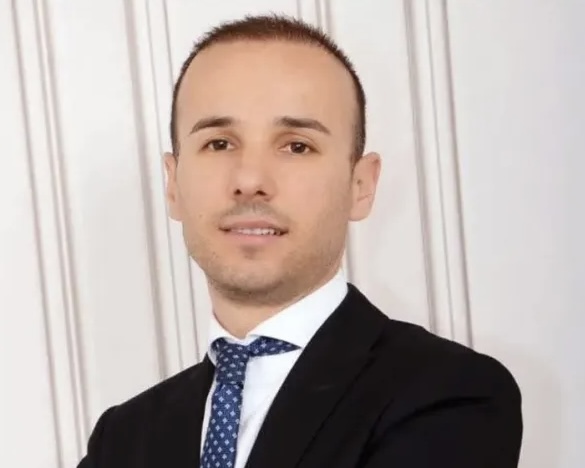Defense lawyer’s scandalous arrest leads to criticism of justice system’s corporativist drift

An Albanian lawyer, Ulian Bajrami, was arrested after a tense courtroom exchange in Elbasan, where he accused the prosecutor of submitting false evidence in a case and vowed to file a criminal complaint. The incident occurred during a hearing in which Bajrami represented a defendant arrested for illegal possession of weapons.
Why is this important: The arrest of a defense lawyer for simply protesting to follow the legal course against a prosecutor, has sparked a wave of outrage among the legal community, which called it an alarming escalation and a dangerous precedent. The National Bar Association described it as the “institutionalization of a prosecutors’ state,” and insisted that Bajrami was simply fulfilling his professional duty by exposing alleged misconduct in the prosecution’s evidence.
In protest, the Bar Association announced a nationwide boycott of court proceedings, covering all levels of the judiciary — including the Constitutional Court — except for cases involving the review of security measures. The Association also demanded an urgent investigation from the High Judicial Council (KLGJ), High Prosecutorial Council (KLP), and the Inspectorate of Justice (ILD).
Context: According to the courtroom audio, Bajrami challenged prosecutor Gjergj Ceka, saying:
“The prosecutor’s request for detention and evaluation of arrest is based on evidence, which contains falsified data. I will personally deal with you by pursuing charges against the prosecutor and the judicial police officers. Madam judge, I will file a criminal complaint.”
At that point, according to the recording, prosecutor Ceka reacted angrily, saying:
“He should be arrested…”
In an intervention that has been widely condemned, the presiding judge, intervened to stop the confrontation by fully taking the side of the prosecutor. She addressed the lawyer by telling him that “Threats are not tolerated in this courtroom. Focus on your defense, or I will have to remove you and appoint another lawyer.”
In a decision that is unprecedented and has caused shock, the next evening, on Saturday, the Elbasan Prosecution issued an arrest warrant for the lawyer, charging him with “Threat due to duty,” “Opposition and assault against a judge,” and “Threat against a judge.”
A dramatic red flag for the justice system: The incident has reignited a broader debate about the corporativist tendencies within Albania’s justice system. Commentators and analysts warn that the balance of power between prosecution and defense has tilted dangerously in favor of the prosecution, with judges often accused of simply rubberstamping prosecutorial requests. They note too that reformed justice institutions are increasingly showing signs of institutional arrogance.
Until now, much of this criticism has focused on SPAK, the Special Anti-Corruption Structure. While enjoying great support by the Albanian public for its unprecedented record in fighting high-level corruption, SPAK has also been accused of excessive use of pre-trial detention, pressuring witnesses, and treating suspects harshly. Despite these concerns, given SPAK’s popularity and harsh methods, most politicians are reluctant to challenge it. Prime Minister Edi Rama did publicly criticize SPAK for its “human rights problems” and cases of problematic investigative practices but has since avoided direct confrontation.
Many observers now see Bajrami’s arrest as evidence that SPAK’s prosecutorial culture of intimidation is spreading throughout the rest of the justice system, threatening the independence of defense lawyers and the fairness of trials.
Note on role of international partners: Adding to the concern is the silence of Albania’s international partners. The United States, under President Donald Trump, has largely withdrawn from active engagement in Albania’s judicial reform. More troubling however, is the European Union’s uncritical and seemingly unconditional support for justice institutions, regardless of their conduct. In a comment to The Economist a few months ago, about the concerns on SPAK’s methods raised by the Prime Minister, an unidentified EU ambassador went so far as to call them “bollocks”.
However, critics argue that this reflexive, unexamined support — a knee-jerk reaction seemingly meant to protect the political image of the reform and the EU’s contribution in it — prevents honest evaluation of what is happening on the ground. In the long run, they warn, this approach is deeply counterproductive, as it normalizes practices that would be unthinkable in any EU member state and encourages justice institutions to operate without accountability or introspection. By offering unconditional praise, the EU effectively removes any motivation for self-criticism or self-reflection within a system that, while it has achieved remarkable successes in fighting corruption and organized crime, remains far from perfect and has yet to develop the necessary mechanisms that guarantee balance, transparency, and restraint.


